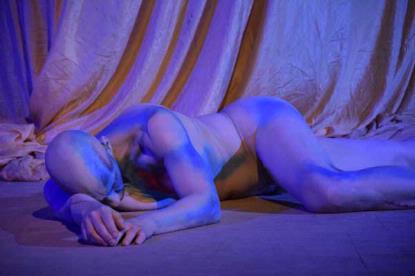
Lindel Hart and Linda McInerney have been collaborating for two years on an adaptation of Mary Shelley’s Frankenstein. In the first year, they researched, imagined, and Lindel wrote. They spent endless hours on Linda’s couch dreaming out how the show might be put together; which characters, scenes, themes, and ideas were right for the stage and important for the story in this time. Over the months a play emerged. They recently offered a development performance of the first version of the play in Greenfield. Following two months of rewrites and revisions, they are in production for a second offering at the Davis Auditorium at the Springfield Museums on September 26 and 27. www.olddeerfieldproductions.org
They engage in creative conversation about the play before and after every rehearsal, wrestling with the themes in the novel, and thinking through how they relate to our world today. Here’s one of their conversations.
Linda: What are you thinking about right now, Lindel?
Lindel: I’m thinking about Mary Shelley and the miracle of her writing. I’m thinking about how she consciously or unconsciously pulled from her life all the time to create these beautiful works of fiction, Frankenstein being the first of many. In some ways she was pulling from her future.
Linda: Yes, that’s something I find hard to understand. How could she know what her life would be like? She was only 18 years old?
Lindel: Some people call it being prescient or having premonitions. But if you think of linear time as an artificial construct and you’re really living in your multiple layers of consciousness, then you draw from all the layers of your experience. You’re pulling from the perceived past, perceived future and the present.
Linda: Yes, it’s like Einstein’s Spooky Action at a Distance. Quantum mechanics.
Lindel: But the fact that she was able to take those pieces of herself from different aspects of time and pull them into this simultaneously beautiful and horrible expression of the human experience is astonishing to me.
Linda: And the way she addressed what it is to be human and why we are here!
Lindel: I think about her life and how she lost her mother as soon as she was born, and she kind of lost her father, too, because he was always aloof.
Linda: He was a man of the mind, and when he engaged her mind, there was a connection.
Lindel: Other than that, his main interactions with her were to demand financial support, because he was always on the edge of poverty. What is shocking to me is this repeated pattern of her father disowning her, not seeing her for months or years at a time, and then writing to her for money.
And her father-in-law, Sir Timothy Shelley, who was a wealthy man, refused to help support her and his own grandchild after Percy Shelley’s untimely death. He kept her on the edge of poverty, not only by withholding money but also by forbidding her by threat of disinheritance from publishing Percy Shelley’s poetry and writing a biography of her husband, both of which would have made her financially independent. There’s this sense of being at the mercy of others more powerful than you are.
Linda: And her expression of that through the Creature, who is impoverished in so many ways, just as Mary Shelley was impoverished.
Lindel: The Creature wanted to experience love and companionship and at every turn was thwarted by the people who could provide it.
In a strange way it’s a metaphor for what we are doing right now on the planet with bio-engineering, climate change, species loss.
Linda: If we could just care for the planet in the simplest and most basic ways, we would not be in this predicament.
Lindel: If we’re looking at humankind versus the earth, who is going to win?
Linda: The earth will win.
Lindel: Yes. It’s like trying to fight gravity. You can’t win.
Linda: Tell me about it!
(They both laugh.)
Lindel: I say this all the time to my yoga students. If you’re doing a pose and you’re trying to fight the pull of gravity, you will lose. But if you use it to pull you into the pose–
Linda: Say that again. If you allow the force of gravity….
Lindel: If you allow gravity to do its job, it will ground you. It’s as if you’re suspended from above while still tethered to the ground, so it frees you to expand energetically. It’s the way that we can be in the world. If we let ourselves give in to the pull of the earth, to the effects of nature, then we don’t have to fight it, to contain it, to control it because we can’t, and then we can do the work of taking care of it, of taking care of ourselves.
Linda: It’s just like the creative process.
Lindel: It is the creative process.
Linda: And it’s our experience of the very same process as the creative family working on Frankenstein. When we find resistance, we have to let it go, because there’s no moving forward with resistance. We know we have to stop and do something else because it’s like working against gravity.
Lindel: When a part of the whole is pushing back, then it doesn’t hold together. You have to let go of that part so the other pieces can work together. Resistance is what limits the expansion of the heart, of the mind, of human consciousness, of community. It’s just the way it works.
Photo by Joseph Dulude II

